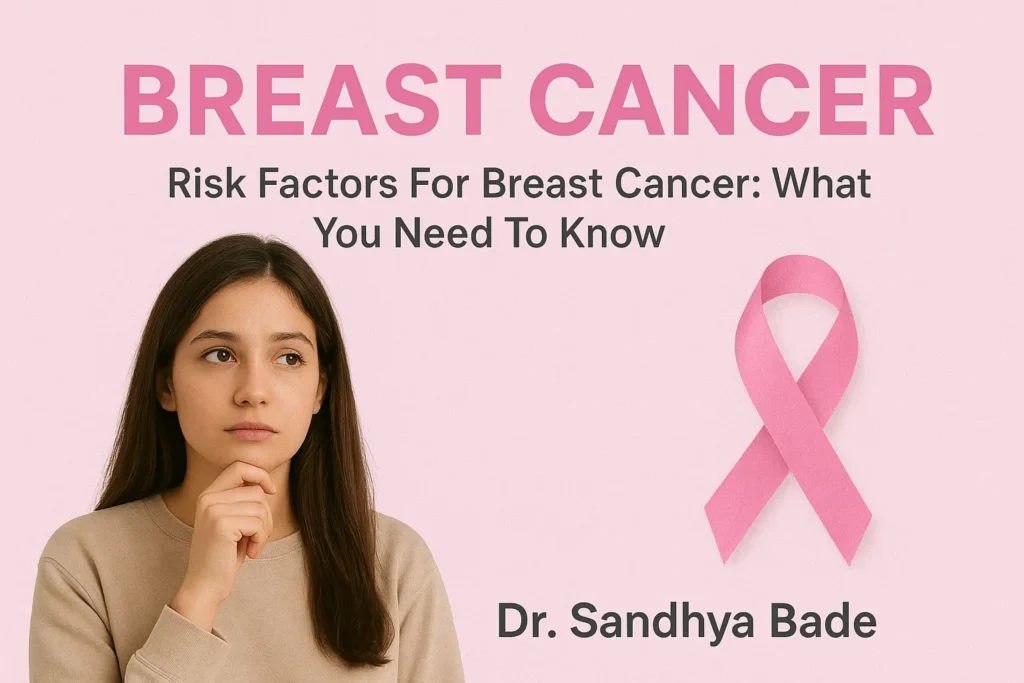Breast cancer continues to be one of the most common health challenges faced by women globally. With millions of new diagnoses each year, awareness and early education are vital. This disease can affect women of all ages, backgrounds, and lifestyles, making it important to understand how risk factors play a role.
These risks may stem from genetic influences, lifestyle habits, or environmental conditions. By recognizing what may increase your chances of developing breast cancer, you can make informed choices to protect your health.
We’ll break down the major risk factors, clear up common myths, and share prevention strategies so you can take proactive steps toward reducing your risk.
Major Risk Factors That May Increase Your Chances of Developing Breast Cancer
Breast cancer risk factors generally fall into three main categories — genetic, lifestyle, and environmental.
- Genetic risks: Family history and specific gene mutations, like BRCA1 and BRCA2, can significantly elevate the risk.
- Lifestyle factors: Poor diet, alcohol consumption, obesity, and lack of exercise have been strongly linked to increased risk.
- Environmental exposure: Contact with certain chemicals, pollutants, or radiation may also raise the chances of developing this disease.
Awareness of these influences helps you make smarter decisions for your long-term health.
A. Genetic Factors
Your genetic makeup can be a powerful predictor of your breast cancer risk. Women who have close relatives diagnosed with this disease — particularly at a young age — should be especially vigilant.
The BRCA1 and BRCA2 genes are the most well-known genetic markers associated with breast cancer. If inherited, these mutations can dramatically raise your risk compared to women without them.
Still, most breast cancer cases are not inherited. They occur due to a mix of non-genetic influences. Genetic testing can help if you have a strong family history, offering valuable insights into your personal risk profile.
Specialists like Dr. Sandhya Bade can guide you through genetic counseling, screening schedules, and personalized prevention plans tailored to your risk level.
B. Lifestyle Choices
Your daily habits have a direct impact on your breast cancer risk. Here’s how lifestyle changes can help:
- Exercise regularly: Aim for at least 150 minutes of moderate activity per week.
- Follow a balanced diet: Include fresh fruits, vegetables, whole grains, and lean proteins, while cutting back on saturated fats and refined sugars.
- Limit alcohol intake: Even small amounts can increase risk, so moderation is key.
- Maintain a healthy weight: Obesity is a known contributor to various cancers, including breast cancer.
Small, consistent changes in your lifestyle can create a significant protective effect over time.
C. Environmental Factors
The environment around you can quietly influence your breast cancer risk. Long-term exposure to harmful chemicals such as pesticides, industrial solvents, and other pollutants has been linked to higher incidence rates.
Women who have undergone radiation therapy for other conditions may also face an increased likelihood of developing breast cancer later in life.
If you are seeking specialized help for diagnosis and care, consider consulting a Lady General Surgeon in Pune who understands the nuances of treating this condition.
Common Myths About Breast Cancer Risk Factors
There’s a lot of misinformation about breast cancer. Let’s clear up a few common misconceptions:
- Myth 1: Only women with a family history are at risk — in fact, most cases occur in women without any family history.
- Myth 2: Wearing bras causes breast cancer — there’s no scientific evidence to support this.
- Myth 3: Younger women can’t get breast cancer — while risk increases with age, younger women are still susceptible.
- Myth 4: Every lump is cancer — many lumps are benign, but any new change should be checked by a Female Specialist in Pune.
How to Reduce Your Risk of Breast Cancer
While some factors are beyond control, others can be managed with healthy choices:
- Exercise regularly and stay active.
- Eat nutrient-rich foods and avoid heavily processed meals.
- Quit smoking and keep alcohol consumption minimal.
- Schedule regular check-ups and screenings.
If surgical care is needed, a Lady Breast Surgeon in Pune can provide expert treatment tailored to your condition.
Genetic counseling is also recommended for those with strong family histories. Knowledge of your risks allows for preventive action and early detection.
The Role of Early Detection and Screening
Catching breast cancer in its earliest stages offers the best chance for successful treatment. Regular screenings can detect abnormal changes before symptoms appear.
- Mammograms remain the most effective screening tool for women over 40 or earlier if at higher risk.
- Self-examinations encourage awareness of what’s normal for your body.
- Discuss your screening schedule with a healthcare provider who understands your personal and family history.
In some cases, advanced stages may require Breast Cancer Surgery in Pune for optimal results.
Support, Resources, and Expert Care
Facing breast cancer is easier when you have the right support. Organizations such as the American Cancer Society offer information, support groups, and local connections.
In Pune, patients can turn to Dr. Sandhya Bade for compassionate and comprehensive care. Whether you need early screening, ongoing monitoring, or Doctors for Breast Pain in Pune, expert guidance ensures you’re not navigating this alone.
Taking Control of Your Health
Understanding the risk factors for breast cancer is the first step toward prevention. While genetic influences like BRCA1 and BRCA2 can’t be changed, lifestyle habits and environmental awareness are within your control.
Early detection is equally vital. Consulting a trusted specialist such as Dr. Sandhya Bade, known for her expertise in Breast Cancer Treatment in Pune, ensures you receive the right care at the right time.
By staying informed, making healthy choices, and working closely with medical professionals, you can take charge of your breast health and reduce your risks for the future.
Address:- Vignaharta, Sai Canary New Road, near Rugved Uptown, Balewadi, Pune, Maharashtra 411045
Phone:- 7769 88 1155
Get Direction



